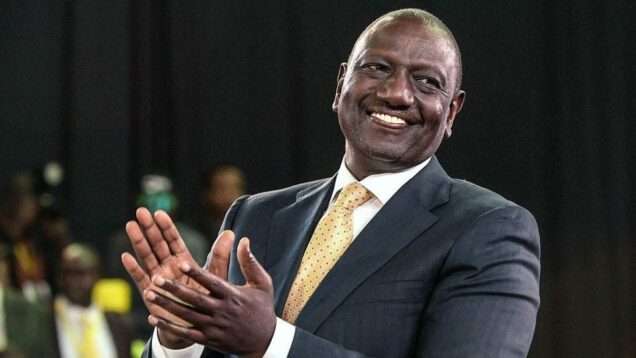Mr. William Samoei Arap Ruto, 55, was named Kenya’s new president on Monday by the chairperson of the Independent Electoral and Boundaries Commission (IEBC), Wafula Chebukati after winning by a narrow 50.49 percent in the August 9 vote against longstanding aspirant, Raila Odinga .
Interestingly, the President-elect is the father-in-law to a Nigerian, Dr. Alexander Ezenagu who tied the knot with Ruto’s firstborn daughter, June Ruto in Karen last year. Dr. Ezenagu is a University of Ibadan Law graduate and a University of Cambridge alumni. He is currently an Assistant Law professor at a university in a Qatar.
Ruto’s victory came on the heels of being able to identify with the unemployed youths referred to as “hustlers”. He was able to sell his political campaign using relatable slogans, which gave him more credibility and popularity among the masses. As the deputy president for 10 years, he had to compete as a “hustler”, which he identified himself as, with the “dynasties”, that is the Kenyan elite.
His political standing improved when he opposed Mr. Kenyatta and Mr. Odinga’s unpopular and expensive year-long attempt to change the constitution at a time when many Kenyans were suffering, including losing their jobs as a result of the prolonged effects of the pandemic. Ultimately, the Supreme Court declared the action unconstitutional, which helped Mr. Ruto’s campaign.
About William Samoei Arap Ruto
William Samoei Arap Ruto, born 21 December 1966, is a Kenyan politician who is the president-elect of Kenya and has served as the country’s deputy president since 2013.
Ruto was elected Deputy President alongside President Uhuru Kenyatta on the Jubilee Alliance ticket in the 2013 presidential election. From 1998 to 2013, Ruto served as a Member of Parliament (MP). From August to December 2002, he was Minister of Home Affairs in the Daniel Arap Moi administration. He later served as Minister of Agriculture in the Mwai Kibaki administration from 2008 to 2010, and as Minister of Higher Education from April to October 2010.
Early life and education
His parents- Daniel Cheruiyot and Sarah Cheruiyot welcomed William Ruto into the world on December 21, 1966 in Sambut Village, Kamagut, Uasin Gishu County. He completed his primary education at Kerotet Primary School. Prior to enrolling in Kapsabet Boys High School in Nandi County for his Advanced Levels, he attended Wareng Secondary School for his Ordinary Levels.
His strict Protestant parents, who served as elders in the neighborhood African Inland Church, influenced his religious beliefs by pressuring him to regularly take part in church activities and sing in the choir. According to interviews with classmates, neighbors, and friends, Mr. Ruto displayed his ambition from a young age. They claimed that he also protected them from bullies from other villages, and regularly won debates in his group. He was quite intelligent as his answer to math questions usually saved his classmates from being caned.
He kept sheep and cows, went rabbit hunting with friends, and went barefoot to school. As a young man growing up with his parents, he once asked his parents to give him a small patch of their land to plant maize. He also sold chicken to make ends meet after high school.
Later, in 1990, he graduated from the University of Nairobi with a BSc in Botany and Zoology.
Ruto went on to earn an MSc in Plant Ecology, graduating in 2011 and enrolled in a Ph.D. program the following year, and after several setbacks, he completed and was awarded a Ph.D. from the University of Nairobi on December 21, 2018. Ruto was an active member of the Christian Union during his time on campus for the undergraduate course. He was also the Chairman of the University of Nairobi Choir.
Foray into Politics
Ruto met President Daniel Arap Moi through his church leadership activities at the University of Nairobi, who would later introduce him to Kenya politics, specifically during the 1992 general elections.
He ran against Reuben Chesire in 1997 for the parliamentary seat representing Eldoret North. Mr. Chesire served as a lawmaker, a prominent figure in the ruling party, and a supporter of Daniel arap Moi. However, Mr. Ruto took a chance and organized his friends to canvass the area on his behalf and succeeded.
After the bloody and divisive 2007 elections, his political growth almost ended. He was charged with crimes against humanity by the International Criminal Court for allegedly inciting violence that led to more than 1,200 deaths and 600,000 displaced people. Among the accusations were those of murder, persecution, and home eviction.
However, in 2016, the prosecution’s case against him was dropped because the administration he oversaw as vice president obstructed the gathering of evidence.
As President-elect
Despite Mr. Ruto’s political achievements, his village is still in need of development more than 25 years after he joined the government. Many there depend on livestock trading or driving motorcycle taxis to make ends meet.
According to the villagers, Mr. Ruto has donated to a few churches and schools here and there, but the majority of the area’s roads are unpaved, and many people live in mud homes without proper toilets.
Many of Mr. Ruto’s former classmates and his supporters believe his election as president will bring about change to the entire country because, according to Mr. Ruto, “I may be the son of a nobody but I promise to make Kenya the country of everybody,” he once said in his pitch to voters.
